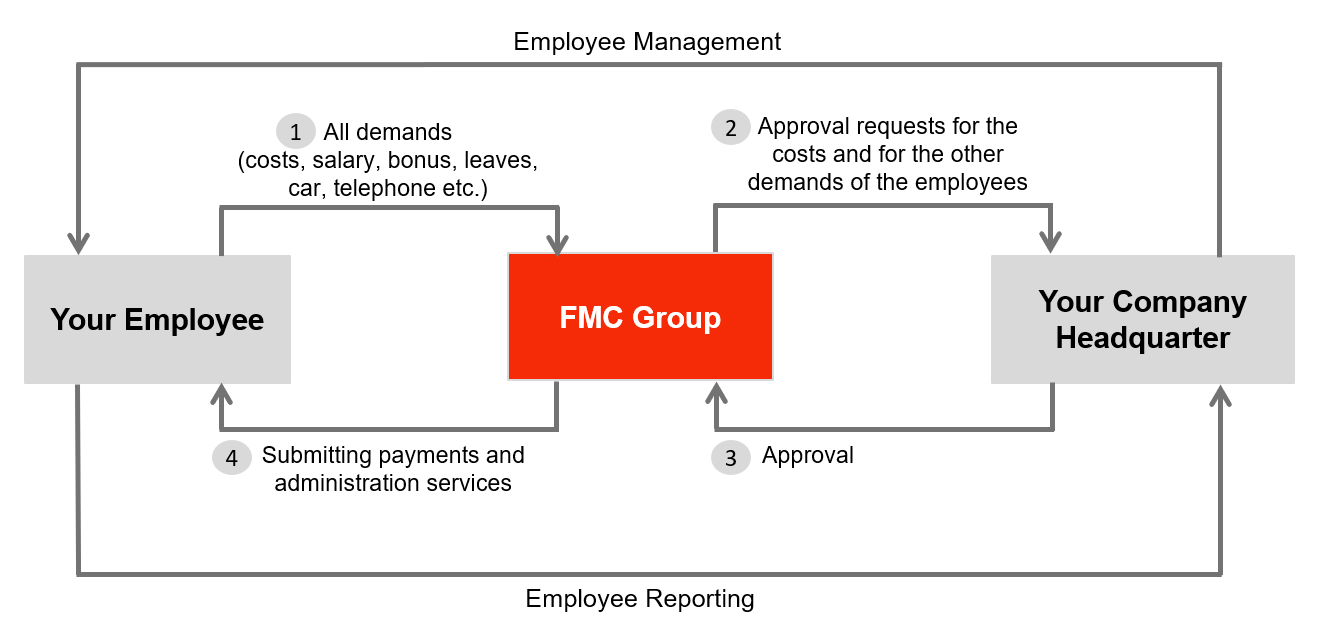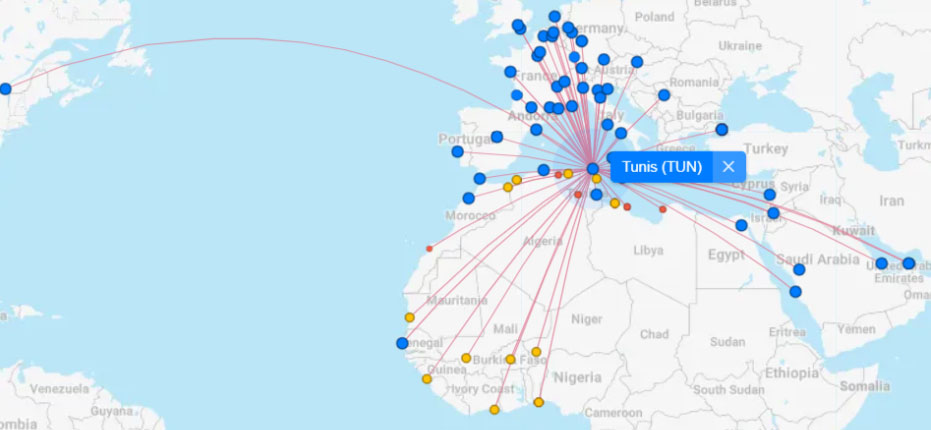
Employer of Record Tunisia (EOR Tunisia)
With FMC Group’s Employer of Record Tunisia service, you can have your own local employees without the need to register and administrate a local entity. Our EOR Tunisia service allows you to develop your potential in North Africa while leaving the administrative issues of local requirements to the responsibility of FMC Group.
Our clients achieve remarkable results, especially for sales, marketing & business development, distributor management, and maintenance & service roles. If your local business grows, you always can choose to transfer the employees to your own subsidiary.
Tunisia is an excellent location to have your own employees if you want to develop your business in North Africa. Tunisia has good relations with its neighbors Algeria, Morocco, and Libya. It offers a great availability of affordable and well-educated employees with good language skills in English and French.
Our free webinar on demand “Tunisia and Morocco as a Hub for Developing Your Business in Francophone North-Africa” has a lot of additional information. You can also subscribe to our monthly Business News North Africa newsletters.
Content:
Employer of Record Tunisia - FMC Group's Approach
- Our local recruiting team can search for employees according to your specifications and needs. We can also hire pre-selected candidates.
- We negotiate and conclude the employment agreement with the selected employee according to your guidelines and local employment laws
- We hire your employees in Tunisia at our own local legal entity
- The local legal entity will pay social security and payroll taxes in compliance with local laws in Tunisia. The payroll accounting is managed according to international standards.
- Expenses or allowances are first checked by us, and after your approval, paid out to the employee
- Leave requests are monitored by us and granted after your approval
- We provide standardized processes and guidelines as well as regular feedback meetings for your employee
- We can provide IT infrastructure & mail service: laptop, mobile phone, mobile phone subscription including internet, etc.
- If needed, we can negotiate leasing and rental contracts for company cars
- We can provide additional benefits like providing private health insurance or meal vouchers system with monthly loading of tax-free meal allowances.
- We assist with visa applications, as well as the booking of flights through our travel agency

Benefits of using an Employer of Record EOR Provider
- Flexible, fast, and effortless way to enter the Tunisian Market and whole French-speaking North Africa
- Access to the highly-educated workforce in Tunisia, supported by our own local recruitment team
- Reliable way to build and manage a network of major accounts and distributors
- You stay in control of all market activities, according to your own strategy
- You can focus on value-adding tasks while FMC Group takes care of local administrative tasks.
- If necessary, you can exit the Tunisian market easily
- We take care of your local employees. We organize team events, motivation, and involvement meetings
- We can provide additional services like office space, company car, IT equipment, etc.
- If required, our experts can support you with Market Research or Distributor Search in Tunisia.
- We can also support you in defining the right Internationalization Strategy
Advantages of Tunisia as a hub for North Africa
Tunisia enjoys a strategic geographical position to serve EU, Africa, and Maghreb markets, located on the southern shore of the Mediterranean and in northern Africa,
Tunisia is the entry point for the whole North African markets as well as the French-speaking African countries. These represent 59% of the 300 million French speakers in the world.
Tunisia has signed several bilateral and multilateral trade agreements contributing to the consolidation of its position and its membership in its international and regional environment.
Tunisia offers investors a large amount of qualified and skilled employees at very competitive costs. It has a pool of talented young graduates with high potential and whose skills and qualifications in various fields correspond to the needs of the corporate world:
- High Multilingualism (Arabic, French, English)
- Over 65,000 new graduates each year
- 35% of graduates specialized in computer science, engineering, communications & other technical fields
- Tunisia has 9 international airports covering the whole territory with 2,000+ weekly flights serving 50+ cities.
- Tunis-Carthage International Airport has non-stop passenger flights scheduled to 69 destinations in 33 countries.
- You can find more information on the Tunisia Industry Portal

Hiring an Employee
Employment Contract: Indefinite vs. Fixed
In Tunisia, full-time employment contracts can be either indefinite (CDI – Contrat à Durée Indéterminée) or fixed-term (CDD – Contrat à Durée Déterminée), with the latter not exceeding 4 years, including renewals. Beyond this duration, the employment is considered permanent, and there is no additional probation period.
Sectoral collective agreements—essentially, agreements between groups within a particular sector—play a significant role in labor laws. Such agreements may stipulate additional rights and responsibilities. However, an individual contract between an employer and an employee takes precedence if it offers more favorable terms. For example, while the standard working week in Tunisia is 48 hours, certain collective agreements specify a 40-hour week.
Probation Period
When individuals are hired under a permanent contract (CDI), they are typically subject to a probationary period. This allows the employer to evaluate the employee’s competencies and determine if the role is a good fit. The exact duration of this period is guided by collective agreements, established customs, or statutory law. As a point of reference, the Collective Agreement “Cadre” (managerial position) has the following probation periods:
- Execution agents: 6 months
- Supervisors: 9 months
- Executives: 1 year
This period can be renewed once.
Notice Period
Should there be a need for termination, a written notice must be provided at least one month in advance. The notice period can range between one to three months. Moreover, employees have the right to take leave during the latter half of the notice period to pursue new job opportunities.
Overtime & Maximum Working Hours
In Tunisia, standard working hours per week can be either 40 or 48 hours, with employees being entitled to at least one rest day per week. Any work beyond these stipulated hours qualifies as overtime, warranting additional compensation. The rate of this compensation varies based on the standard working hours:
- 48-hour workweek: 75% additional pay for overtime
- Less than 48-hour workweek: 25% additional pay up to 48 hours and 50% beyond
- Part-time: 50% additional pay for overtime
Remuneration and Benefits in Tunisia
- Payroll in Tunisia is done monthly, a “13th salary” is very common in Tunisia. In some sectors, there are bonuses related to the „14th salary“ and above.
- The salaries must be paid out in local currency (Tunisian Dinar), the negotiations can be made in another currency.
- Salaries are usually negotiated as net-salary
- Most common side benefits are: meal vouchers, private health insurance, company car (for sales positions), fuel allowances
Time-off Policies
Public Holidays
Tunisia observes several public holidays, including but not limited to:
- New Year’s Day (January 1)
- Revolution and Youth Day (January 14)
- Independence Day (March 20)
- Martyr’s Day (April 9)
- Labor Day (May 1)
- Eid Al-Fitr (varying dates in May)
- Eid Al-Adha (varying dates in July)
- Republic Day (July 25)
- Islamic New Year (varying dates in August)
- Women’s Day (August 13)
- Evacuation Day (October 15)
- Mawlid (varying dates in October, November)
Public holidays are classified by sector of activity and fixed in the collective agreements.
Annual Leave
Employees accrue one day off for every month of service, amounting to 12 days annually. The longer an employee serves, the more annual leave they accrue. Every 5 years, employees get an additional day off. Employees between the ages of 18 and 20 are given 18 paid working days off, irrespective of their length of service. As part of our employer of record Tunisa service, we track all leave requests.
Other Leave Types
Mothers are eligible for a 30-day maternity leave, extended to 45 days if there are complications. While on this leave, employers aren’t obligated to provide a salary, as the employee receives a stipulated allowance.
Fathers are entitled to a 2-day paternity leave, which they should use within the first week after their child’s birth
Additional Leave and Benefits
The Tunisian Labor Code mandates extra leave in certain situations, including but not limited to:
- Death of a spouse: 3 days
- Death of a direct family member: 3 days
- Marriage: 3 days
Sick Leave
If employees cannot work because of sickness or injury, they are required to submit a medical note within 48 hours. The initial 5 days of such leave are without pay. After this period, Social Security provides sickness benefits covering two-thirds of their regular wage for up to six months.
Terminating an Employee
Fixed-term contracts end when they reach their end date. Permanent contracts can come to an end through mutual agreement, employee resignation, or employee termination. Once an employee passes the probationary period, any termination initiated by the employer requires a legitimate cause. Acceptable reasons are:
- Economic grounds
- Serious violations, like the rejection of work directives or unwarranted absences
- Extended medical leaves, particularly when paired with economic factors
All other terminations could be perceived as unfair dismissal. The employee has then the right to 1-2, in exceptional cases up to 4 monthly salaries per year of service as serveance.
End of service gratuity: Employees receive a “End of service gratuity” of 1-day salary per month of service. Limit is 3 months salary.
Disclaimer: Although we carefully researched and compiled the above information, we do not give any guarantee with respect to the actuality, correctness, and completeness.




